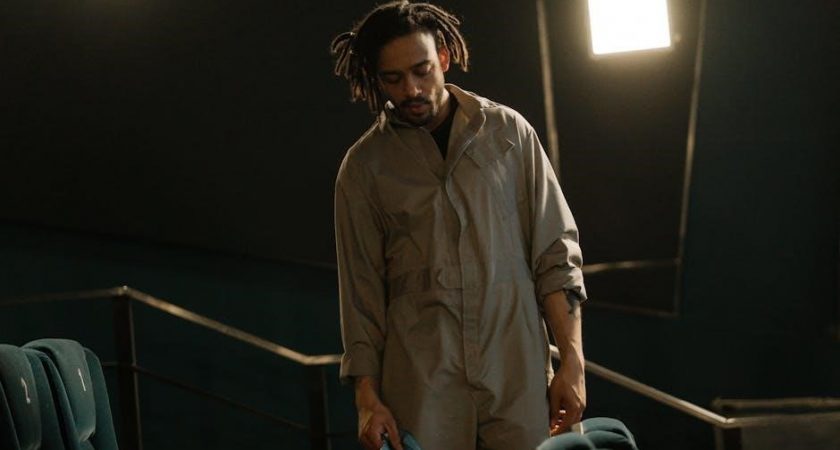The housekeeping department ensures cleanliness and maintenance of rooms, public areas, and back-of-house, playing a crucial role in guest satisfaction and operational efficiency in hospitality settings.
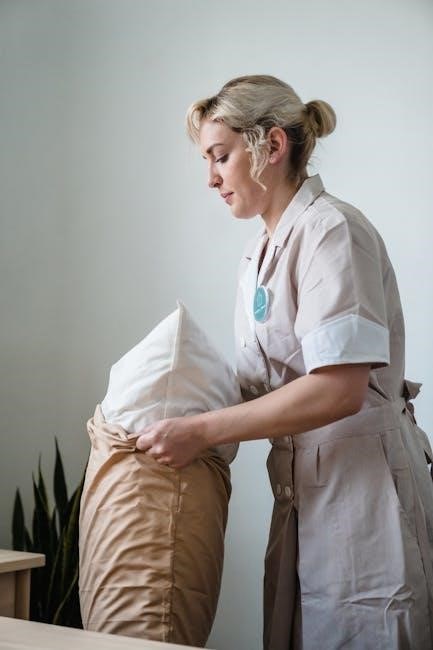
Organizational Structure of Housekeeping Department
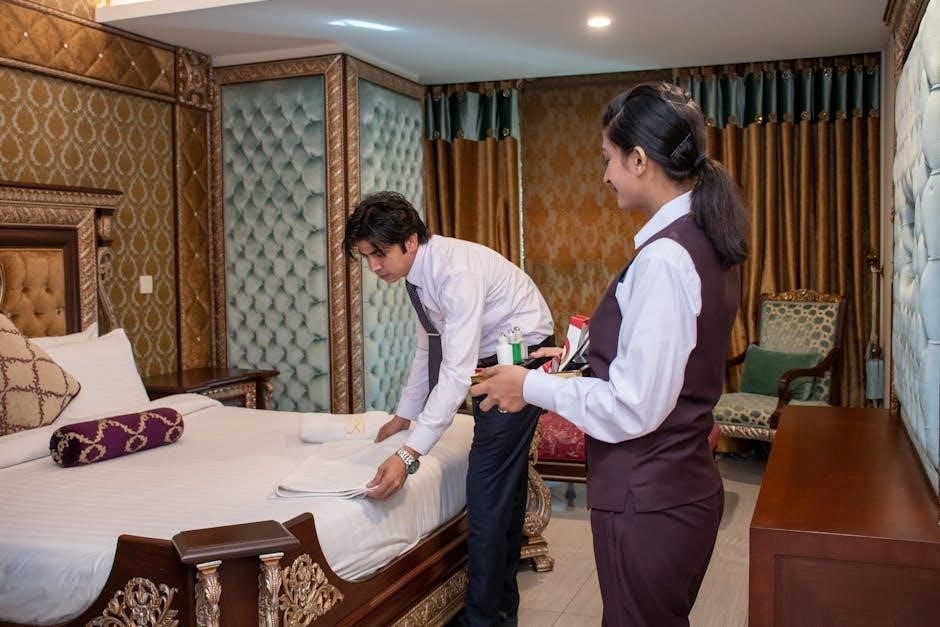
The housekeeping department is hierarchically structured, typically led by an Executive Housekeeper, supported by Assistant Housekeepers, Supervisors, and Guest Room Attendants, varying by hotel size and operational needs.
Roles and Hierarchy in Housekeeping

The housekeeping department operates within a clear hierarchical structure, ensuring efficient workflow and accountability. At the top, the Executive Housekeeper oversees all operations, while Assistant Housekeepers manage specific areas like floor supervision or linen. Supervisors coordinate daily tasks, and Guest Room Attendants handle room cleaning and guest supply replenishment. Additionally, Housepersons support with tasks such as linen delivery and cleaning public areas. This structured hierarchy ensures seamless execution of duties, maintaining high standards of cleanliness and guest satisfaction.
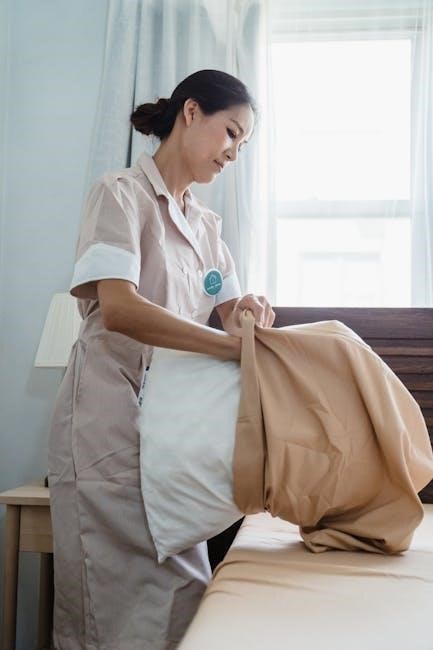
Key Duties of Housekeeping Staff
Housekeeping staff are responsible for cleaning guest rooms, changing linens, and replenishing supplies. They maintain high hygiene standards, ensure public areas are tidy, and promptly address guest requests.
Executive Housekeeper Responsibilities
The executive housekeeper oversees the entire housekeeping department, ensuring high standards of cleanliness and maintenance. They coordinate daily operations, manage staff schedules, and maintain linen inventory. Responsibilities include monitoring sanitation protocols, addressing guest complaints, and conducting quality checks. They also train personnel, implement safety measures, and maintain budgetary controls. The executive housekeeper ensures adherence to hotel policies and fosters a positive work environment to enhance guest satisfaction and operational efficiency. Their role is pivotal in maintaining the hotel’s reputation for cleanliness and hospitality.
Housekeeping Assistant Responsibilities
The housekeeping assistant supports the executive housekeeper in managing daily operations and ensuring high standards of cleanliness. Responsibilities include coordinating cleaning schedules, maintaining cleaning supplies, and assisting with linen and laundry management. They also help supervise staff, address guest requests, and ensure public areas are clean. Additionally, they may assist in training new employees and monitoring inventory levels of cleaning agents and linens. Their role is essential in maintaining efficiency and ensuring all housekeeping tasks are completed to the highest standard, contributing to overall guest satisfaction and operational smoothness.
Guest Room Attendant Duties
A guest room attendant is responsible for cleaning and preparing guest rooms, ensuring they meet high standards of cleanliness and comfort. Duties include changing linens, making beds, and replenishing toiletries and amenities. They also clean bathrooms, vacuum floors, and dust surfaces, ensuring rooms are spotless. Additionally, they handle laundry collection and delivery, restock supplies, and address guest requests promptly. Their role is vital in creating a welcoming environment, ensuring guest satisfaction, and maintaining the hotel’s reputation for quality and service.
Maintenance of Cleanliness and Hygiene Standards
Housekeeping staff ensure high standards of sanitation, safety, and comfort by maintaining cleanliness in guest rooms, public areas, and back-of-house spaces, adhering to strict hygiene protocols.
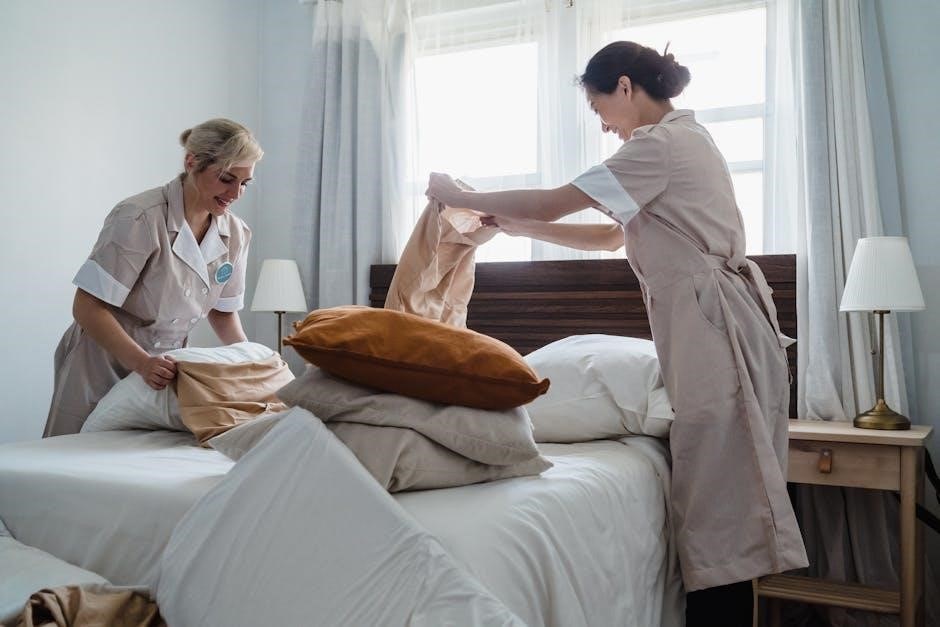
Cleaning Protocols for Guest Rooms
Guest room cleaning protocols ensure a clean, safe, and comfortable environment for guests. Staff follow detailed procedures, including changing linens, sanitizing bathrooms, and replenishing amenities. Daily tasks involve making beds, restocking supplies, and removing trash. Deep cleaning is scheduled regularly to maintain high hygiene standards. Housekeeping personnel use approved cleaning agents and equipment to meet hotel quality benchmarks. Compliance with sanitation schedules and guest preferences is essential to deliver a seamless experience, ensuring guest satisfaction and safety throughout their stay.
Sanitation Procedures for Public Areas
Sanitation procedures for public areas ensure a clean and hygienic environment for guests and staff. Housekeeping staff sanitize high-touch surfaces, such as handrails, doorknobs, and countertops, regularly. Floors in lobbies, corridors, and public restrooms are mopped and cleaned multiple times daily; Trash cans are emptied and disinfected, while restrooms are stocked with essentials like toilet paper and soap. Public areas are also dusted and polished to maintain aesthetics. These tasks are performed using approved cleaning agents and follow strict schedules to uphold hygiene standards and guest satisfaction.
Laundry and Linen Management
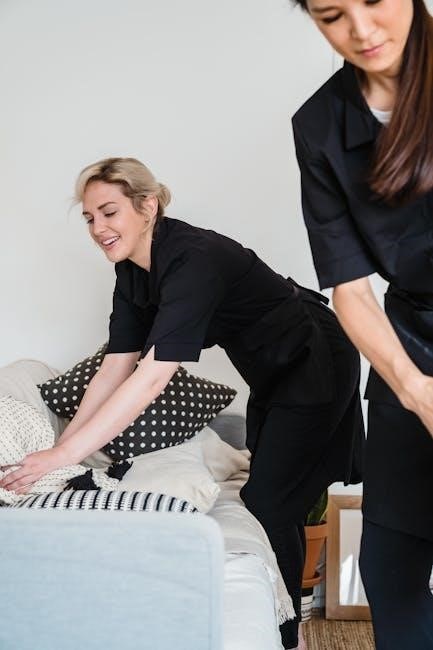
Laundry and linen management involves maintaining hygiene standards, overseeing laundry operations, and ensuring adequate linen supplies. It includes washing, drying, and distributing linens efficiently while adhering to quality protocols.
Linen Inventory and Maintenance
Linen inventory and maintenance involve tracking and managing linen supplies to ensure availability and quality. This includes maintaining ledgers for different types of linens, ensuring regular stock audits, and organizing storage areas. The housekeeping team is responsible for monitoring linen usage, preventing shortages, and addressing overstock. They also oversee the proper cleaning, drying, and distribution of linens while adhering to hygiene standards. Regular inspections and maintenance of linen supplies are essential to uphold guest comfort and satisfaction. Proper inventory management ensures efficient operations and minimizes waste.
Laundry Operations and Procedures
Laundry operations involve the sorting, washing, drying, and folding of linens and uniforms. Housekeeping staff ensures all items are cleaned according to hygiene standards and returned to the appropriate areas. This includes monitoring cleaning agents, overseeing laundry machinery, and maintaining inventory of supplies. Proper procedures ensure efficient processing, prevent damage to fabrics, and maintain quality. Regular maintenance of laundry equipment is also essential to avoid breakdowns and ensure smooth operations. Adherence to safety protocols guarantees a clean and hygienic environment for both guests and staff.
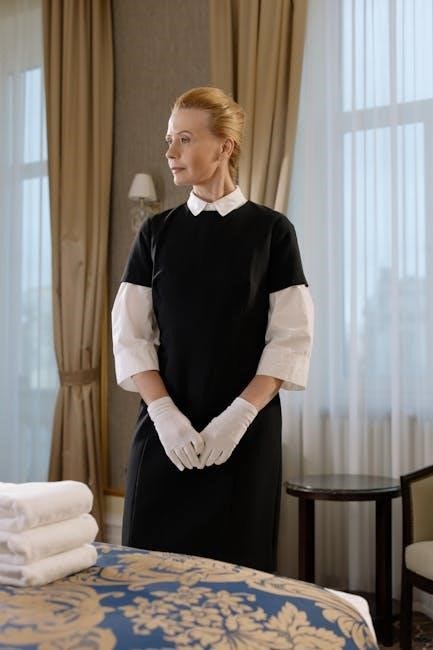
Public Area and Back-of-House Cleaning
Housekeeping staff ensures public spaces like lobbies, corridors, and rest areas are clean and well-maintained. They also manage back-of-house areas, ensuring organization and hygiene standards are upheld.
Cleaning Schedules for Public Spaces
Public spaces, including lobbies, corridors, and rest areas, require regular cleaning to maintain hygiene and aesthetics. Housekeeping staff follows strict schedules, ensuring high-traffic areas are cleaned frequently, especially during peak times. Tasks include vacuuming, mopping, sanitizing surfaces, and restocking essentials. Cleaning protocols are tailored to the facility’s needs, with adjustments made for special events or increased foot traffic. These schedules are essential to uphold cleanliness standards and provide a comfortable environment for guests and staff.
Back-of-House Maintenance Duties
Back-of-house areas, such as storage rooms, laundry facilities, and staff quarters, require consistent maintenance to ensure operational efficiency. Housekeeping staff is responsible for cleaning and organizing these spaces, ensuring they are free from clutter and hazards. Duties include sanitizing surfaces, managing waste disposal, and maintaining equipment functionality. Additionally, staff must ensure adequate lighting and ventilation in these areas; These tasks are crucial for maintaining a safe and hygienic working environment for all employees, indirectly contributing to the overall guest experience and hotel operations.

Staff Supervision and Coordination
Housekeeping staff supervision involves organizing daily tasks, ensuring high standards of cleanliness, and motivating the team to achieve operational goals efficiently while maintaining guest satisfaction.
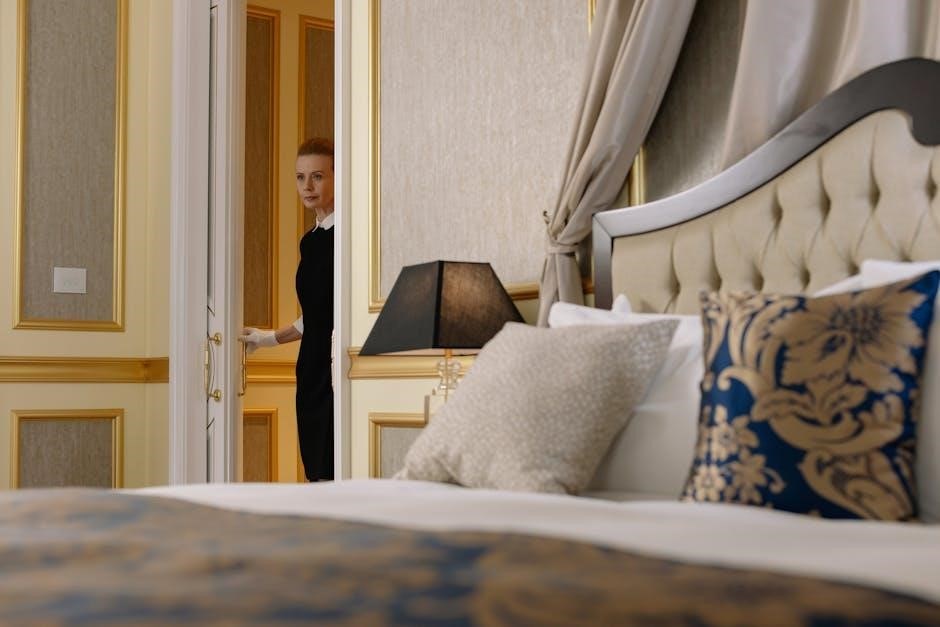
Day-to-Day Coordination of Housekeeping Personnel
The day-to-day coordination of housekeeping personnel involves organizing and assigning tasks, managing rosters, and ensuring all areas are cleaned to high standards. Supervisors oversee staff activities, handle guest requests, and maintain cleanliness schedules. They also monitor supply levels, report maintenance issues, and ensure safety protocols are followed. Effective communication and problem-solving are key to maintaining efficiency and guest satisfaction. This role ensures seamless operations, balancing staff workload with hotel demands while upholding hygiene and quality standards consistently.
Training and Quality Control Measures
Training and quality control measures are essential to ensure the housekeeping staff delivers consistent, high-standard services. These measures include implementing training programs for new and existing staff, conducting regular inspections of rooms and public areas, and maintaining detailed checklists to monitor cleanliness and hygiene. Supervisors provide feedback and address any shortcomings promptly. Additionally, guest feedback is used to refine processes and improve service quality. These measures ensure the housekeeping team maintains professionalism, efficiency, and adherence to hotel standards, ultimately enhancing guest satisfaction and operational excellence.
Housekeeping staff are integral to maintaining the cleanliness, safety, and aesthetic appeal of hospitality settings, directly impacting guest satisfaction and operational success. Their dedication ensures high standards of hygiene, comfort, and organization, fostering a positive guest experience. From cleaning rooms to managing laundry, their attention to detail and commitment to excellence are vital. Their role extends beyond cleaning, contributing to the overall reputation and efficiency of the establishment, making them indispensable in ensuring a welcoming and well-maintained environment for both guests and staff.
